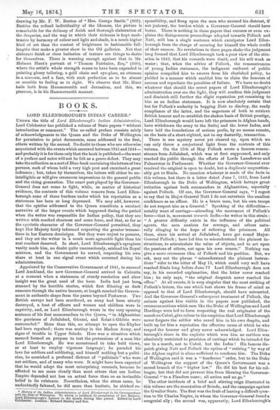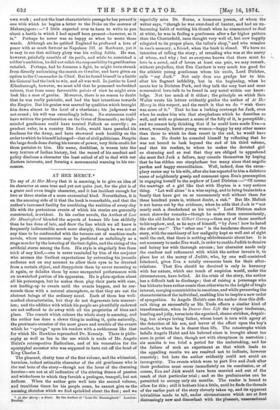BOOKS.
LORD ELLENBOROUGH'S INDIAN CAREER.*
UNDER the title of Lord Ellenborough's Indian Administration, Lord Colchester has published a volume of State papers "without introduction or comment." The so-called preface consists solely of acknowledgments to the Queen and the Duke of Wellington for permission to print documents, some addressed to the first, others written by the second. No doubt to those who are otherwise acquainted with the events which occurred between 1841 and 1844— and probably it is for these only that the book is published—the want of a preface and notes will not be felt as a grave defect. They may take the collection as a sort of Blue-book containing theletters of two persons, each of whom held a very high post and exercised a great influence ; but, taken by themselves, the letters will either be un- intelligible or will give erroneous impressions to the general public and the rising generation. The exact part played by the Governor- General does not come to light, while, as matter of historical evidence, the contents of this volume remove from Lord Ellen- borough none of those burdens under which his reputation as a statesman has been so long depressed. We may add, however, that the epistles addressed to the Queen constitute a succinct narrative of the larger events which happened during the period when the writer was responsible for Indian policy, that they are written with marked clearness and some force, and that, so far as the egotistic character of the Governor-General permitted, they kept Her Majesty fairly informed respecting the greater transac- tions in her Eastern dominions. But they were unjust to persons, and they set the writer in a much more agreeable light than his real conduct deserved. In short, Lord Ellenborough's egregious vanity made him, no doubt quite unconsciously, mislead his Royal mistress, and the Government he served, respecting his own share at least in one signal event which occurred during his administration.
Appointed by the Conservative Government of 1841, to succeed Lord Auckland, the new Governor-General arrived in Calcutta at a moment when a statesman of sturdy resolution and clear insight was the great need of the hour. India had just been, stunned by the horrible stories, which first filtering as dark rumours through the native bazaars, at length reached the Govern- ment in authentic shape from the passes beyond Peshawur. Two British envoys had been murdered, an army had been utterly destroyed, a host of officers and women and children were in captivity, and, as Lord Ellenborough wrote in the very opening sentence of his first memorandum to the Queen, "in Afghanistan the garrisons of Jellalabad, Ghuzni, and Kelat-i-Ghilzie were surrounded." More than this, an attempt to open the Khyber had been repulsed ; there was mutiny in the Madras Army, and signs of trouble in Upper Scinde. Here was a situation which seemed formed on purpose to test the pretensions of a man like Lord Ellenborough. He was accustomed to take bold Views, or at least to employ vigorous language"; he paraded his love for soldiers and soldiering, and himself nothing but a politi- cian, he nourished a profound distrust of " politica% " who were not soldiers, and of many who were. It might-have been expected that he would adopt the most enterprising counsels, because he affected to see more clearly than most others that our Indian Empire depended not less on actual force than on an invincible belief in its existence. Nevertheless, when the stress came, he undoubtedly faltered, he did more than hesitate, he shirked re-
* History of the Indian Administration of Lord Elknborough in his Correspondence with the Date of Wellington. To which is prefixed, by permission of her Majesty, Lord Ellenborough's Letters to the Queen during that period. Edited by Lord Colchester. London: Richard Bentley and Bon.
sponsibility, and flung upon the men who aroused his distrust, if not jealousy, the burden which a Governor-General should have borne. There is nothing in these papers that excuses or even ex- plains the disingenuous proceedings adopted towards Pollock and Nott, still less a single sentence which exculpates Lord Ellen- borough from the charge of securing for himself the whole credit of their success. No revelations in these pages shake the judgment long formed that Lord Ellenborough took spoor view of the situ- ation in 1842, that his counsels were timid, and his will weak as water ; that, when the advice of Pollock, the remonstrances of young Indian statesmen, the indignant outburst of public opinion compelled him to swerve from his cherished policy, he yielded in a manner which enabled him to claim the honours of success and repudiate the penalties of failure. We have no doubt whatever that should the secret papers of Lord Ellenborough's administration ever see the light, they will confirm this judgment and diminish still further the slight reputation yet remaining to him as an Indian statesman. It is now absolutely certain that but for Pollock's audacity in begging Nott to disobey, the ready compliance of the latter, and the eagerness of both to retrieve British honour and re-establish the shaken basis of British prestige,. Lord Ellenborough would have left the prisoners in Afghan hands, have withdrawn the army to the Sutlej and the lower Indus, and have laid the foundations of serious perils, by no means remote, on the basis of a short-sighted, not to say dastardly, transaction.
There is one mystery never yet • cleared up, upon which we can only throw a conjectural light from the contents of this volume. On the 13th of May Pollock wrote a famous remon- strance from Jellalabad, which was at first suppressed, and only reached the public through the efforts of Lords Lansdowne and Palmerston in Parliament. Whether the Governor-General aver- received the original is open to doubt, but a duplicate unquestion- ably got to Simla. No mention whatevir is made of the facts in this volume, but there is a letter dated June 7, 1842, from Lord Ellenborough to the Duke of Wellington, which betrays great irritation against both commanders in Afghanistan, especially against Pollock. Of one, the Governor-General says, "I regret to say that in Major-General Nott I do not entertain the smallest confidence as an officer. He is a brave man, but his own troops do not respect him as a General." Speaking of the difficulties— notably want of carriage—attending the movement of Pollock's force—that is, movement towards India—he writes in this strain "A greater difficulty exists in the influence of the political agents, the men anxious for revenge, and others natu- rally clinging to the hope of relieving the prisoners. All these, since his arrival at Jellalabad, have got round Major- General Pollock ; have led him to misunderstand the plainest in- structions, to miscalculate the value of objects, and to act upon the passions of others, not upon his own reason." Nothing can give a more erroneous idea of Pollock and his position. But, we- ask, may not the phrase "misunderstand the plainest instruc- tions" refer to the letter of May 13, which could very well have- reached Simla long before June 7? Lord Ellenborough does not say, in his recorded explanation, that the letter never reached him ; he only says, "the original despatch never reached the office." At all events, it is very singular that the moat striking of Pollock's letters, the one which best shows his frame of mind aa opposed to that of Lord Ellenborough, should have miscarried. And the Governor-General's subsequent treatment of Pollock, the animus against him visible in the papers now published, the erroneous notions which men like the Duke of Wellington and Lord Hardinge were led to form respecting the real originator of the march on Cabul, give colour to the suspicion that Lord Ellenborough never forgave the soldier who saved him in his own despite, and built up for him a reputation the effective cause of which he who. reaped the honour and glory never acknowledged. Lord Ellen- borough's share in the exploits which won him an earldom was absolutely restricted to provision of carriage which he intended for- use in a march, not to Cabul, but the Indus His famous dis- patch giving Nott and Pollock the option of " retiring " by way of the Afghan capital is alone sufficient to condemn him. The Duke of Wellington said it was a " handsome " order, but to the Duke of Wellington the support of the Queen's Government was a sacred branch of the "higher law." He did his best for his col- league, but that did not prevent him from likening the Governor- General "to a Flanders mare ; all action and no go."
The other incidents of a brief and stirring reign illustrated in this volume are the annexation of Scinde, and the campaign against the Gwalior State. The first was the fruit of leaving a difficult ques- tion to Sir Charles Napier, in whom the Governor-General found a congenial ally ; the second was, apparently, Lord Ellenborongh's
own work ; and not the least characteristic passage he has penned is one with which he begins a letter to the Duke on the morrow of Maharajapore :—" I little expected ever to have to write to you .about a battle in which I had myself been present—however, so it is." Perhaps he never was so happy as when he wrote those words. Although ere he quitted England he professed a love of peace with as much fervour as Napoleon III. at Bordeaux, yet it is easy to see that military glory was his ruling foible. He was, however, painfully sensible of its perils, and while he nourished a soldier's ambition, he did not relish the responsibility its gratification entailed. Perhaps, had he foreseen a fight, he might have shrunk from directly authorising the march on Cr, walior, and have given an -option to the Commander-in-Chief. But he found himself in a battle his General had the luck to win, and all was well. In justice to Lord Ellenborough, however, we must add that he possessed undoubted talents, that from some favourable points of view he might even look like a man of genius. Moreover, there is no reason to doubt that he was really patriotic, and had the best intentions towards the Empire. But his genius was marred by qualities which brought him down almost to the level of a charlatan ; his judgment was not sound ; his will was exceedingly infirm. No statesman could have written the proclamation on the Gates of Somnauth ; no high- minded gentleman could have treated Pollock so scurvily ; no prudent ruler, in a country like India, would have paraded his fondness for the Army, and have showered such hostility on the order to which he himself belonged—that of civil politicians. Despite the large deeds done during his tenure of power, very little credit for them pertains to him. His name, doubtless, is woven into the very texture of Indian history, but the record of his conduct and policy discloses a character the least suited of all to deal with our Eastern interests, and forming a monumental warning to his suc- cessors.



































 Previous page
Previous page